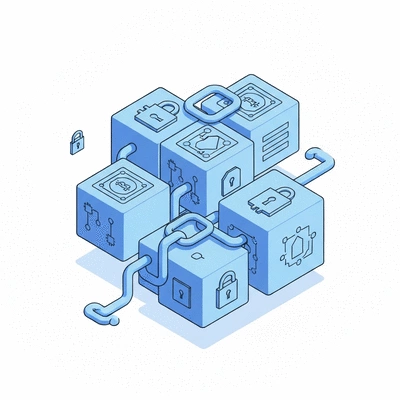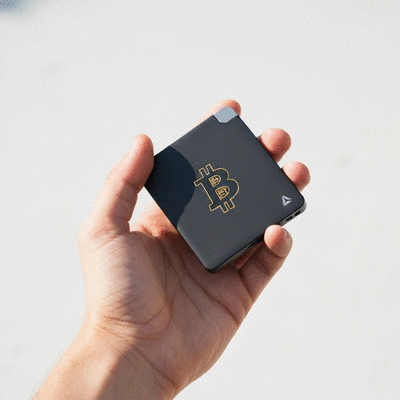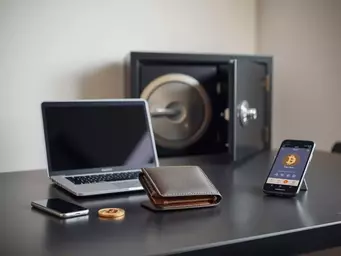
Understanding Blockchain Security Basics
As the world evolves rapidly in the realm of cryptocurrency, understanding the intricate security measures behind Bitcoin becomes imperative. Imagine being able to engage with a digital currency that keeps your transactions safe, your identity secure, and your assets protected—all thanks to the robust framework of blockchain security and cryptography.
What You Will Learn
- Blockchain Security Fundamentals: Learn how security ensures the integrity and confidentiality of data in Bitcoin transactions.
- The Role of Cryptography: Understand cryptography's essential functions, including encryption, hashing, and digital signatures in safeguarding transactions.
- Wallet Security Best Practices: Discover key strategies to protect your Bitcoin wallets, including strong passwords and two-factor authentication.
- Cold Storage vs. Hot Wallets: Grasp the differences and benefits of storing Bitcoin offline versus online for enhanced security.
Blockchain Security Simplified: Cryptography's Role
This visual illustrates the core components of blockchain security and how cryptography safeguards Bitcoin transactions, making complex concepts accessible.
What is Blockchain Security?
Ensures integrity & confidentiality of information in a decentralized network.
Cryptography Safeguards Transactions
Complex algorithms protect data & verify identities.
- ✓ Encryption
- ✓ Hashing
- ✓ Digital Signatures
Key Takeaways for Security
Individual practices crucial for maintaining security.
- ✓ Wallet Security
- ✓ 2FA
- ✓ Strong Passwords
Cold Storage vs. Hot Wallets
Balance needs for access and safeguarding.
Future Outlook: Evolving Threats
Staying informed is crucial.
Understanding Blockchain Security: The Role of Cryptography in Bitcoin Transactions
When diving into the world of Bitcoin, it's crucial to grasp the concept of blockchain security. This technology underpins the entire Bitcoin network, ensuring that each transaction is safe and trustworthy. Without robust security measures, the potential for fraud and manipulation would undermine the very essence of what makes Bitcoin valuable. So, why is blockchain security so important?
Essentially, blockchain security protects not just the currency itself, but also the data and identities of those involved in transactions. It builds trust among users, allowing them to engage with Bitcoin confidently. Understanding this security framework is the first step for anyone looking to navigate the cryptocurrency landscape effectively.

What is Blockchain Security and Why is it Important?
At its core, blockchain security involves a combination of techniques and protocols that ensure the integrity and confidentiality of the information exchanged. This includes everything from transaction validation to user verification. In a decentralized environment like Bitcoin, where there’s no central authority, having a secure framework is vital. The importance of robust security in blockchain technology has been recognized at high levels, with discussions on its applications even for government operations, as highlighted in a report discussing blockchain applications for the federal government.
- Integrity: Ensures that data remains accurate and unaltered.
- Confidentiality: Protects user information and transaction details from unauthorized access.
- Availability: Guarantees that the network remains functional and accessible to users at all times.
These elements work together to form a safety net, preventing malicious activities that could harm both individuals and the network as a whole. By comprehending the significance of blockchain security, we empower ourselves with the knowledge needed to engage responsibly in the cryptocurrency market.
How Does Cryptography Safeguard Bitcoin Transactions?
Cryptography is the backbone of blockchain security. It employs complex algorithms to protect data, ensuring only authorized parties can access or alter it. In Bitcoin transactions, cryptography serves several key functions, including securing transaction data and verifying the identities of parties involved. The U.S. Treasury Department recognizes the critical role of these technologies in the financial system, emphasizing the need for responsible innovation in digital assets, which includes strong cryptographic protections.
- Encryption: Protects transaction data and user identities.
- Hashing: Ensures data integrity by creating a unique digital fingerprint for each transaction. This process helps maintain the immutability of the blockchain, a concept explored in detail in the Journal of Financial Management and Public Institutions.
- Digital signatures: Verify the authenticity of transactions and confirm that they originate from the rightful owner.
By implementing these cryptographic methods, Bitcoin creates a secure environment where users can confidently send and receive transactions without fear of fraud. As someone dedicated to educating about Bitcoin, I believe understanding these protective measures is crucial for anyone looking to step into the world of cryptocurrency.
Pro Tip
Did you know? Regularly updating your wallet software and using hardware wallets for long-term storage can significantly enhance your security against online threats. These practices ensure that your Bitcoin transactions remain safe and your assets protected from evolving cyber risks.
Summarizing the Importance of Cryptography in Blockchain Security
As we delve deeper into the world of Bitcoin and its underlying technologies, understanding the critical role of cryptography in blockchain security becomes essential. Cryptography ensures that each transaction is not only secure but also reliable, providing a foundation of trust within the decentralized network. The importance of this security cannot be overstated, especially for those who are new to cryptocurrency.
Every time you send Bitcoin, cryptography protects your transactions from unauthorized access and fraud. It safeguards your assets, ensuring that only you have control over your funds. This is especially crucial in a world where digital threats are ever-evolving and increasingly sophisticated.
Key Takeaways on Securing Your Bitcoin Transactions
- Understanding Wallet Security: Always choose wallets that use strong cryptographic protocols.
- Enable Two-Factor Authentication: Adding another layer of security can make a significant difference.
- Stay Informed: Regularly update yourself on the latest security practices and threats.
- Use Strong Passwords: Ensure your wallet and exchange accounts have unique, complex passwords.
These key takeaways serve as a reminder that while the technology behind Bitcoin is robust, our individual practices play a crucial role in maintaining that security. Awareness and proactive measures can significantly mitigate risks.
Frequently Asked Questions (FAQs)
- What is blockchain security?
- Blockchain security refers to the techniques and protocols that ensure the integrity, confidentiality, and availability of information within a decentralized network like Bitcoin. It protects transactions from fraud and ensures data accuracy.
- How does cryptography protect Bitcoin transactions?
- Cryptography is essential for securing Bitcoin transactions through encryption (protecting data), hashing (creating unique digital fingerprints for integrity), and digital signatures (verifying transaction authenticity and ownership).
- What are the key best practices for Bitcoin wallet security?
- Key practices include using strong cryptographic protocols for wallets, enabling two-factor authentication, staying informed about security practices, and using unique, complex passwords for accounts.
- What is the difference between cold storage and hot wallets?
- Cold storage involves keeping Bitcoin offline (e.g., hardware wallets) for high security against online threats. Hot wallets are online and convenient for transactions but carry a higher risk of cyber-attacks. A balanced approach often involves using both.
- Why is staying informed about security threats important in cryptocurrency?
- The cryptocurrency landscape is constantly evolving, with new threats and technologies emerging regularly. Staying informed through newsletters, community engagement, and webinars helps users make proactive decisions to protect their assets from evolving risks.
Practical Tips for Enhancing Personal Blockchain Security
In my experience educating others about cryptocurrency, I’ve found that practical tips can empower newcomers to navigate securely. Here are some essential practices to consider:
- Backup Your Wallet: Regular backups ensure you don’t lose access to your funds in case of device loss.
- Regular Software Updates: Keeping your wallet and software up-to-date protects against vulnerabilities.
- Be Wary of Phishing Attacks: Always verify the URLs of sites you visit and don’t share your private keys.
- Utilize Hardware Wallets: Consider using hardware wallets for long-term storage as they are less susceptible to online threats.
Implementing these practical tips can significantly enhance your security and confidence when engaging with Bitcoin transactions. Remember, education is key, and at How Does Bitcoin Work, we're here to help guide you through this exciting landscape!

The Role of Cold Storage vs. Hot Wallets in Security
When it comes to storing your Bitcoin, it’s crucial to understand the distinction between cold storage and hot wallets. Cold storage refers to keeping your funds offline, such as in a hardware wallet, while hot wallets are connected to the internet.
- Cold Storage: This method is considered highly secure since it’s not vulnerable to online hacking.
- Hot Wallets: While more convenient for transactions, these wallets are at a higher risk of cyber threats.
- Balance Your Needs: A mix of both can offer convenient access while also safeguarding larger amounts of Bitcoin.
In my journey with Bitcoin, I've seen how understanding these storage options can lead to more informed decisions, enhancing your overall security strategy. Whether you’re making your first transaction or managing a portfolio, knowing how to balance cold and hot storage can be your safeguard against unforeseen threats.
Looking Ahead: The Future of Blockchain Security and Cryptography
The landscape of blockchain and cryptocurrency is constantly evolving. Staying ahead of the curve means being aware of the latest developments in security measures and cryptographic technologies. As we continue to explore Bitcoin, it’s essential to adapt to these changes to protect our assets effectively.
Staying Informed About Evolving Threats and Technologies
In the fast-paced world of cryptocurrency, being informed is crucial. Following reliable sources and updates on potential threats can help you make proactive decisions. Here are some strategies to stay updated:
- Subscribe to Security Newsletters: Get regular updates about the latest developments in blockchain security.
- Engage with Online Communities: Platforms like Reddit and Twitter can provide real-time insights and peer support.
- Attend Webinars and Conferences: Learning directly from experts can deepen your understanding of emerging technologies.
By adopting a mindset of continuous learning, you can better prepare yourself for the future of Bitcoin and its security challenges. Remember, at How Does Bitcoin Work, we aim to empower you with the knowledge you need to thrive in this dynamic environment!
Encouraging Safe Practices for Users in the Cryptocurrency Space
Promoting safe practices within the cryptocurrency community is vital for the long-term success and security of blockchain technology. Here are a few practices to advocate:
- Share Knowledge: Help others in the community understand the importance of security.
- Report Scams: If you encounter scams, report them to protect fellow users.
- Encourage Best Practices: Regular discussions on security can foster a culture of vigilance among users.
Engaging with your peers can create a more secure environment for everyone. Encouraging safe practices not only protects individuals but also strengthens the integrity of the entire cryptocurrency ecosystem.
Regulatory Compliance and Its Impact on Blockchain Security
As blockchain technology gains traction, regulatory compliance is becoming increasingly important. Regulations can influence security standards, ensuring that companies maintain robust security protocols to protect users. Here’s why this matters:
- Increased Accountability: Regulations require businesses to adhere to strict security measures.
- Consumer Protection: Compliance helps protect users from fraud and cyber threats.
- Standardization of Practices: Regulations can lead to industry-wide best practices, raising overall security.
Staying informed about regulatory changes can help you navigate the evolving landscape of blockchain security. As we continue to advocate for a safer cryptocurrency experience at How Does Bitcoin Work, understanding these implications is essential for every user.
Recap of Key Points
Here is a quick recap of the important points discussed in the article:
- Understanding Blockchain Security: It ensures the integrity, confidentiality, and availability of transactions, protecting user data and building trust.
- The Role of Cryptography: Cryptography secures Bitcoin transactions through encryption, hashing, and digital signatures, creating a safe environment for users.
- Key Security Practices: Use strong wallets, enable two-factor authentication, stay informed on security practices, and create strong passwords.
- Cold Storage vs. Hot Wallets: Understand the differences and balance their use for better security based on needs.
- Continuous Learning: Stay updated on evolving threats and technologies in the cryptocurrency space to protect your assets.
- Encouraging Safe Practices: Share knowledge, report scams, and promote security discussions within the cryptocurrency community.





Bitcoin Wallets in DeFi and NFTs
Secure Your Bitcoin Investments Today
Bitcoin Mining's Role in Security
Recovering Your Lost Bitcoin Keys
The Importance of Bitcoin Today